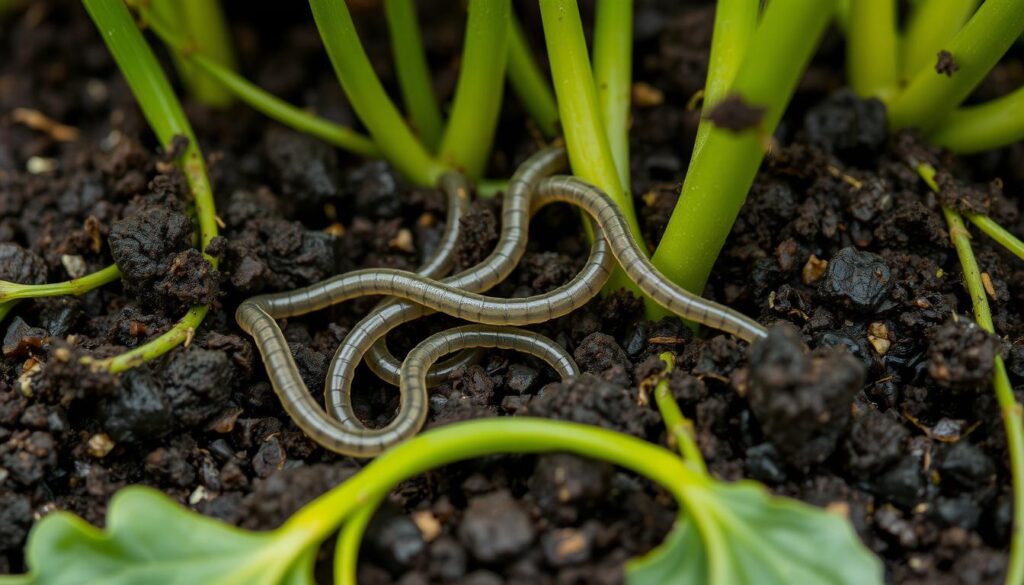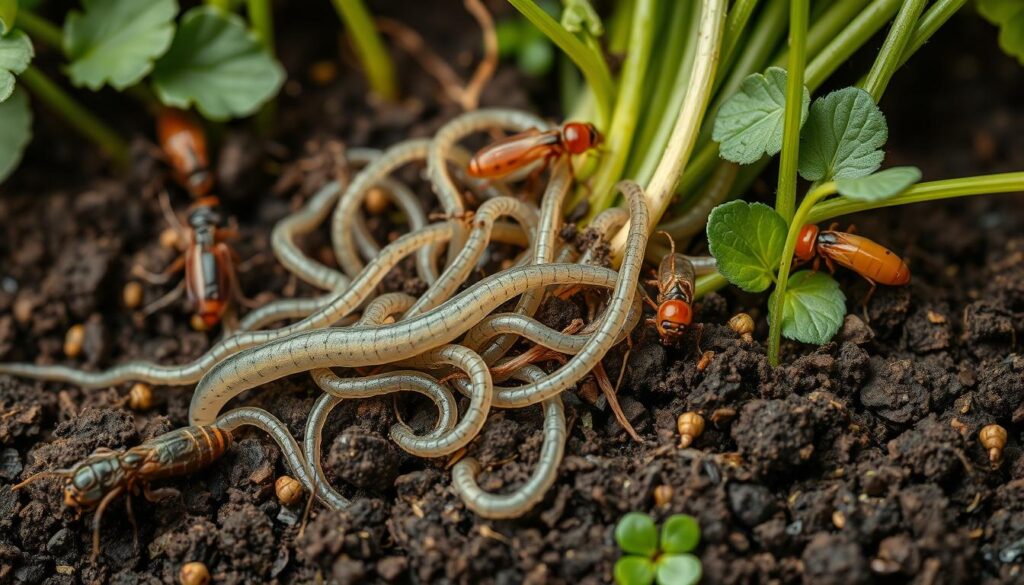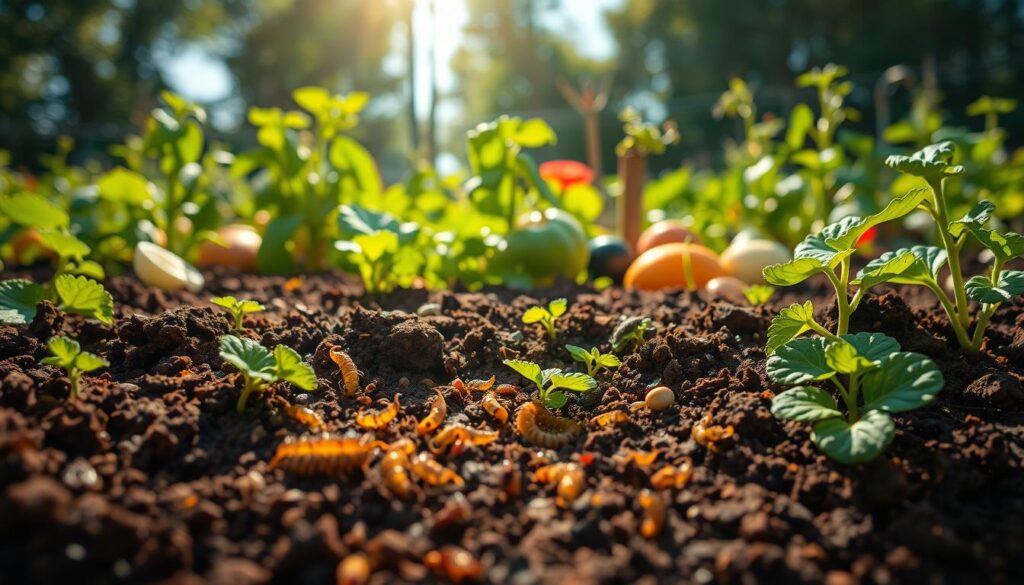Did you know that 70% of pesticides in agriculture are lost to the environment? This shows we need better, more sustainable ways to control pests. Beneficial nematodes are a safe, effective choice instead of chemical pesticides. They are becoming key in agriculture and gardening, helping to target pests and protect the environment.
Beneficial nematodes are tiny worms that fight and kill pest insects. They offer a natural way to control pests, which is becoming more popular. This change could greatly improve how we manage pests in gardens and farms, making pest control more sustainable.

Using beneficial nematodes is a big part of managing pests in a smart way. They help reduce the need for harmful chemicals and balance ecosystems. The growth of using beneficial nematodes is a good sign for agriculture and gardening, and it’s expected to keep growing.
Key Takeaways
- Beneficial nematodes offer a safe and effective alternative to chemical pesticides
- Nematode benefits include their ability to target specific pests and their environmentally friendly nature
- Pest control nematodes have the potential to revolutionize the way we manage pests in our gardens and farms
- The rise of beneficial nematodes is a significant development in the field of agriculture and gardening
- Beneficial nematodes can be used as part of an integrated pest management strategy
- Natural pest control methods like beneficial nematodes are becoming increasingly popular among gardeners and farmers
Understanding Beneficial Nematodes and Their Role in Agriculture
Beneficial nematodes are tiny worms that help control pests in organic pest management. They are a key part of biological pest control and a safer choice than chemical pesticides. By using nematode solutions, farmers and gardeners can improve soil health nematodes, which is vital for a balanced ecosystem.
The use of beneficial nematodes in pest control solutions is becoming more popular. This is because they are very effective against many pests. They are especially useful in sustainable gardening practices, which aim to reduce environmental harm. The main advantages of using beneficial nematodes include:
- Targeted pest control: They specifically target harmful pests, protecting beneficial insects.
- Environmental safety: Nematode solutions are safe for the environment because they are non-toxic and biodegradable.
- Improved soil health: They help control pests and improve nutrient cycling, which is good for the soil.
By using sustainable gardening practices with beneficial nematodes, we can make farming and gardening more eco-friendly. This approach reduces environmental harm and supports soil health nematodes and biological pest control.
| Benefit | Description |
|---|---|
| Targeted pest control | Beneficial nematodes specifically target harmful pests, reducing the risk of harming beneficial insects. |
| Environmental safety | Nematode solutions are non-toxic and biodegradable, making them a safe choice for the environment. |
| Improved soil health | Beneficial nematodes help to promote soil health by controlling pest populations and improving nutrient cycling. |
The Science Behind Nematode-Based Pest Management
Nematodes are key in agriculture, acting as natural predators. They come in different species, each with its own benefits. This shift to using nematodes has changed how we fight pests, with many turning to these natural helpers.
It’s important to know about the different nematodes and how they work. Some go after specific pests, like insect larvae. Research has shown that certain nematodes can be very good at controlling pests, cutting down on the need for harmful chemicals.
Using nematodes for pest control has many advantages:
- They target pests without harming other creatures.
- They are better for the environment, reducing chemical use.
- They save money by not needing to use pesticides over and over.

As more people use nematodes for pest control, it’s key to understand the science. By using the right nematodes, farmers and gardeners can fight pests without chemicals. This makes farming more sustainable.
| Nematode Species | Target Pest | Effectiveness |
|---|---|---|
| Steinernema feltiae | Insect larvae | High |
| Heterorhabditis bacteriophora | White grubs | Medium |
Implementing Beneficial Nematodes in Your Garden
Beneficial nematodes are a natural way to control pests in your garden. They are effective and easy to use. To get the most out of them, you need to apply them correctly.
Proper Application Techniques
To use beneficial nematodes, mix them with water and spray the soil. The best time is early morning or late evening when the soil is moist. This method is a sustainable and eco-friendly way to control pests.
Optimal Conditions for Success
The soil needs to be at the right temperature and moisture for nematodes to thrive. The ideal temperature is between 60°F and 90°F. The soil should be moist but not too wet. These conditions are key for successful pest control.

Common Mistakes to Avoid
Don’t apply nematodes at the wrong time or in the wrong amount. Also, make sure to choose the right type for your pest problem. By following these tips, you can create a sustainable pest control system for your garden.
| Pest Problem | Type of Nematodes | Application Rate |
|---|---|---|
| Grubs | Steinernema feltiae | 1 billion per acre |
| Fungus gnats | Steinernema carpocapsae | 500 million per acre |
By following these guidelines, you can create a healthy garden ecosystem. Enjoy the benefits of using beneficial nematodes for years to come.
The Rise of Beneficial Nematodes: Success Stories and Future Directions
Beneficial nematodes are a key part of integrated pest management. Many farmers have seen a big drop in pest damage and better crop yields. By using nematodes, farmers can cut down on chemical pesticides and help the ecosystem.
Success Stories in Commercial Agriculture
Commercial agriculture has seen big wins with nematode pest management. Farms are moving to organic pest control solutions and eco-friendly pest control. These methods are better for the environment and offer a lasting solution for pest control with nematodes.
Research Breakthroughs and Developments
New nematode species have been found, and better ways to apply them have been developed. This makes nematode pest management even more effective. As research keeps going, we’ll see even more creative ways to manage pests.
Environmental Benefits and Sustainability
Using beneficial nematodes in eco-friendly pest control helps the ecosystem and reduces farming’s environmental impact. By choosing organic pest control solutions and integrated pest management, farmers help make our food system more sustainable.
Conclusion: Embracing Nature’s Solution for Sustainable Pest Management
Beneficial nematodes are a natural way to control pests in gardens. They are tiny predators that target many pests without harsh chemicals. This approach helps gardens grow healthily and in harmony with nature.
Using nematodes is good for the environment and improves soil health. As more people want organic gardening, nematodes will become a key solution. They are effective and eco-friendly.
Choosing nature’s pest control means less harm to the environment. It leads to better harvests and gardens free from pests. The future of pest management looks bright, with nematodes playing a big part.
FAQ
What are beneficial nematodes and how do they work?
Beneficial nematodes are tiny worms that live in the soil. They attack and kill pests. Inside the pest, they release bacteria that kill it. Then, they multiply and eventually kill the pest.
What types of pests can beneficial nematodes control?
They can fight many pests in the soil, like grubs and beetle larvae. They also target pests above ground, such as caterpillars and weevils.
How do beneficial nematodes impact the environment?
They are safe for the environment. They are non-toxic and don’t harm beneficial insects or wildlife. They’re a better choice than chemical pesticides, improving soil health and balance.
How do I apply beneficial nematodes in my garden?
Applying them right is key. Use them when the soil is cool and moist, like in the morning or evening. Always follow the instructions and avoid using them in sunlight or dry conditions.
What are some success stories of using beneficial nematodes in agriculture?
Farmers have seen great results. They’ve controlled pests like grubs and weevils. This has led to less damage and better crops.
What are the latest research breakthroughs in the field of beneficial nematodes?
Scientists are always finding new ways to use nematodes. They’re looking at new species and better ways to apply them. This research could make nematodes even more effective for pest control.




